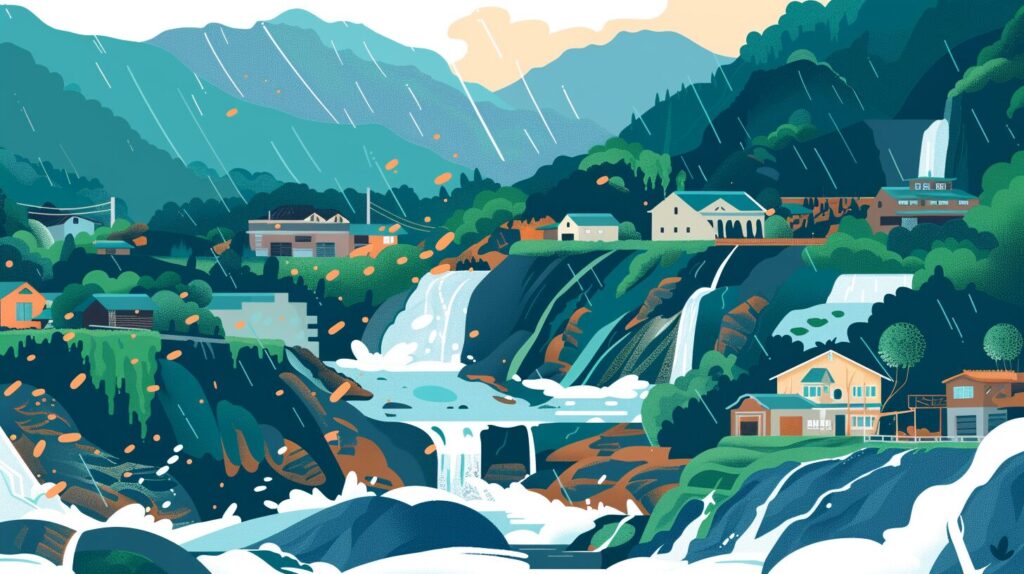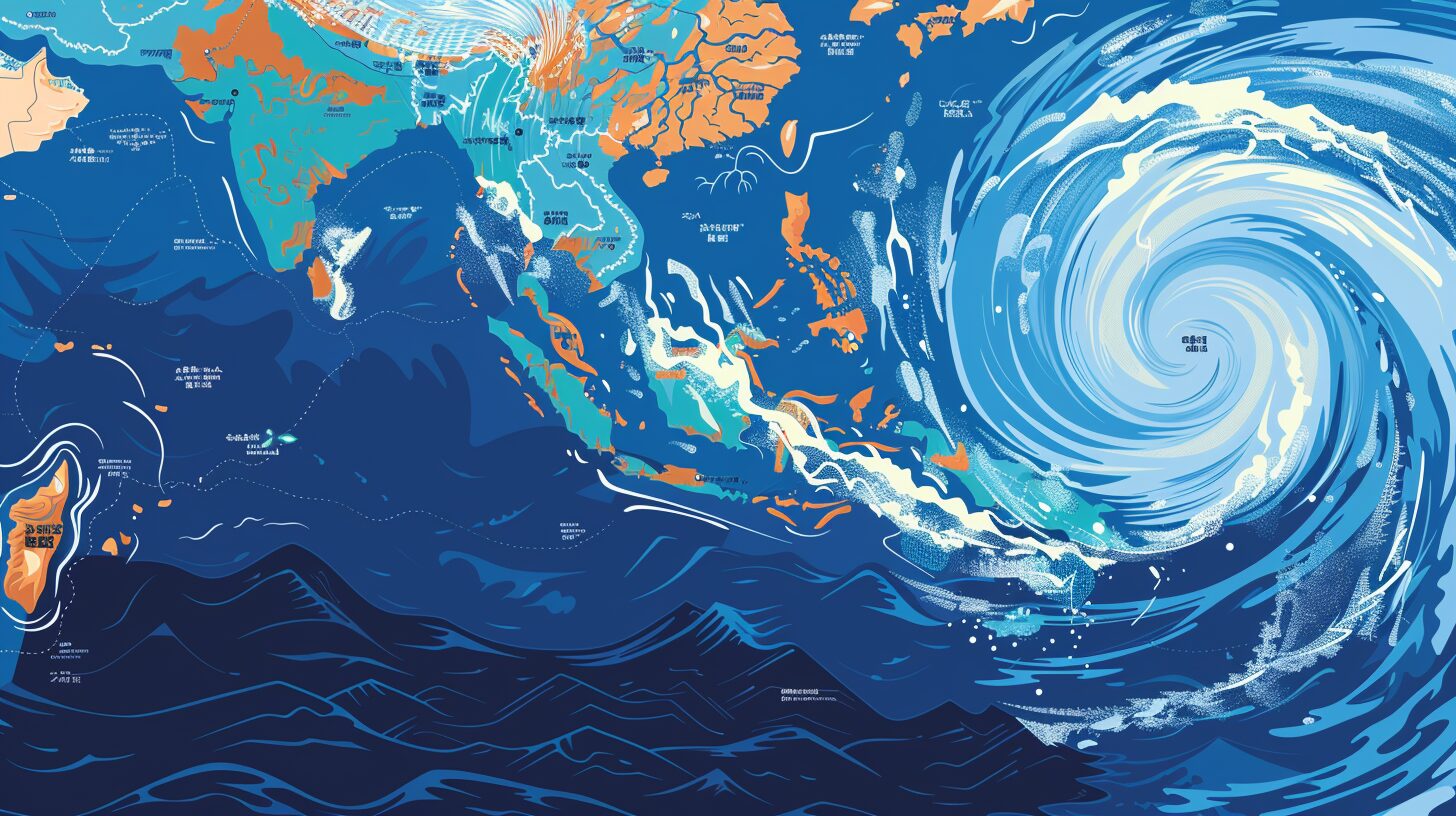台風を英語で説明・紹介するための基本情報と、英会話に役立つ表現をシンプルでわかりやすい英語で紹介します。
英会話ダイアローグ・関連情報・10の質問を通して、台風に関する英語表現を学びます。
英語
英会話ダイアローグを読む前に知っておくと良い前提知識と情報です。
- 台風の基本情報:
- 夏から秋にかけて日本に影響を与える強力な熱帯低気圧で、強風や豪雨、高潮を引き起こす
- 主に夏から秋(6月〜10月頃)が台風シーズン
- 気象庁:
- 台風の進路や強度、影響を予測し、定期的に更新情報を提供
- 交通機関への影響:
- 台風が接近すると、飛行機の欠航や新幹線・電車の運休が発生
- 避難や備蓄:
- 台風が直撃する可能性がある地域では、食料や水、懐中電灯、電池などの備蓄が推奨される
- 自治体の避難勧告が出されることもある
2人が日本に接近中の強力な台風について話しています。
台風の影響、台風に対する準備や対応、気象庁の予報や交通機関の運休、避難の必要性、家の安全対策などを話題にしています。
会話 / dialogue

Hey, Key, did you see the news? There’s a really strong typhoon heading towards Kyushu, and it might even affect us here in Kanto.

Yeah, I saw that. The Japan Meteorological Agency (JMA) said it’s one of the most powerful typhoons this year. They’re expecting it to make landfall in Kyushu tomorrow night.

Right. I was checking the JMA updates, and they’re saying we could get hit with strong winds and heavy rain even here in Tokyo. They’ve already issued warnings for strong winds and potential flooding in some areas.

That sounds serious. Did they mention any transportation changes?

Yeah, they did. Several flights to Kyushu have been canceled, and the Shinkansen between Hiroshima and Hakata is going to be suspended. They’re even saying trains in the Kanto area might stop running if the winds get bad.

That’s typical. I remember last year, when another typhoon hit, most of the trains stopped, and some people had to stay at the stations overnight. It’s smart they’re suspending services ahead of time this time.

I agree. I’m thinking of staying home tomorrow, just in case. The news was also saying that people in Kyushu are preparing by securing their homes and stocking up on food and water.

Yeah, it’s good to be prepared. I stocked up on some supplies earlier today—water, batteries, you know, just in case. And I made sure to charge my phone and power bank.

That’s smart. I still need to get some supplies. I’ve been listening to the news closely, and they’re urging people to avoid unnecessary travel, especially near the coast or rivers.

Definitely. The storm surge and flooding could be really dangerous. I also heard they’ve issued evacuation orders in some areas of Kyushu. People are being told to leave their homes before the heavy rain hits.

That makes sense. The JMA mentioned the potential for landslides in the mountain areas too. It’s good they’re warning people early.

It’s scary, but at least we have all this information. The JMA updates every few hours, so we can keep track of the typhoon’s movement. Plus, the news channels are covering it non-stop.

Yeah, I’ve been checking the latest reports every few hours. It’s amazing how precise the forecasts have become. They’re already predicting how much rain we could get—up to 15 centimeters in some areas.

Wow, that’s a lot. It could definitely cause some flooding. Have you thought about what you’ll do if it gets worse here?

I’ll probably stay home and keep monitoring the situation. If it looks like it’s getting really bad, I’ll consider heading to a shelter. There’s one nearby, just in case.

Good plan. I’ll be doing the same. Let’s just hope it doesn’t hit too hard here in Kanto. But it’s good to be ready for anything.

Agreed. Stay safe, Key. Let’s keep each other updated if anything changes.

Definitely. Take care, Mack!
関連情報 / related information
「台風」について、理解を深めるための「英語での関連情報」です。
台風

What is a Typhoon?
A typhoon is a strong tropical storm that forms over warm ocean waters. It is similar to hurricanes, but typhoons occur mainly in the western Pacific Ocean. Typhoons bring heavy rain and very strong winds. These storms can cause floods, landslides, and damage to buildings. Typhoon season in Japan usually lasts from June to November.
Typhoon Warning System
The Japan Meteorological Agency (JMA) monitors typhoons closely. They provide regular updates about a typhoon’s location, strength, and expected path. These updates help people prepare for the storm. JMA issues warnings when a typhoon is expected to bring dangerous weather conditions. People can check these warnings on TV, radio, or online.
How to Prepare for a Typhoon
When a typhoon is approaching, it’s important to prepare early. People should stock up on supplies like food, water, batteries, and flashlights. It is also important to secure windows and outdoor objects that could blow away in strong winds. In some cases, people may need to evacuate if their area is at risk of flooding or landslides. Staying informed through news and weather reports is key to staying safe during a typhoon.
10の質問 / 10 questions
「台風」について、理解を深めるための「英語での10の質問」です。
1: What is a typhoon?
A typhoon is a powerful tropical storm that forms over warm ocean waters, mainly in the western Pacific. It brings strong winds and heavy rain, often causing floods and landslides.
2: When is typhoon season in Japan?
Typhoon season in Japan usually lasts from June to November, with the most intense storms often occurring in late summer and early autumn.
3: How does the Japan Meteorological Agency (JMA) help during a typhoon?
The JMA provides regular updates on the typhoon's path, strength, and potential impact. They issue warnings and advisories to help people prepare and stay safe.
4: What should people do to prepare for a typhoon?
People should stock up on essentials like food, water, batteries, and flashlights. They should also secure windows and outdoor objects that could be blown away by strong winds.
5: Why is it important to follow typhoon updates?
Following typhoon updates helps people stay informed about the storm’s progress and potential risks, such as floods or landslides, allowing them to take necessary precautions.
6: What impact do typhoons have on transportation?
Typhoons often cause flights to be canceled, trains to be suspended, and roads to be closed due to strong winds and heavy rain, disrupting travel and daily life.
7: What should people do if they are near the coast during a typhoon?
People near the coast should avoid going outside and stay away from the water, as storm surges can cause dangerous flooding.
8: How can typhoons cause damage to buildings?
The strong winds of a typhoon can blow off roofs, break windows, and even cause buildings to collapse, especially if they are not properly secured.
9: What is an evacuation order during a typhoon?
An evacuation order is a directive from local authorities telling people to leave their homes and move to a safer location, such as a shelter, if their area is at high risk of flooding or landslides.
10: How do typhoons affect the economy?
Typhoons can cause significant economic damage by destroying crops, disrupting businesses, and damaging infrastructure, leading to costly repairs and recovery efforts.

和訳付
会話 / dialogue

Hey, Key, did you see the news? There’s a really strong typhoon heading towards Kyushu, and it might even affect us here in Kanto.
ねえ、キー、ニュース見た?とても強い台風が九州に向かっていて、関東にも影響があるかもしれないんだ。

Yeah, I saw that. The Japan Meteorological Agency (JMA) said it’s one of the most powerful typhoons this year. They’re expecting it to make landfall in Kyushu tomorrow night.
ああ、見たよ。気象庁が、今年最強クラスの台風だって言ってた。明日の夜、九州に上陸するらしい。

Right. I was checking the JMA updates, and they’re saying we could get hit with strong winds and heavy rain even here in Tokyo. They’ve already issued warnings for strong winds and potential flooding in some areas.
そうだよね。気象庁の最新情報を見てたんだけど、東京でも強風や大雨が来るかもしれないってさ。すでに強風と洪水の警報が出ているところもあるんだ。

That sounds serious. Did they mention any transportation changes?
それは大変だな。交通機関の変化について何か言ってた?

Yeah, they did. Several flights to Kyushu have been canceled, and the Shinkansen between Hiroshima and Hakata is going to be suspended. They’re even saying trains in the Kanto area might stop running if the winds get bad.
ああ、言ってたよ。九州へのいくつかの便がすでにキャンセルされてるし、広島と博多間の新幹線も運休するんだって。関東でも風が強くなったら、電車も止まるかもしれないって。

That’s typical. I remember last year, when another typhoon hit, most of the trains stopped, and some people had to stay at the stations overnight. It’s smart they’re suspending services ahead of time this time.
それはよくあることだね。去年も台風が来たとき、ほとんどの電車が止まって、駅で一晩過ごした人もいたし。今回は事前に運休するのは賢い判断だよ。

I agree. I’m thinking of staying home tomorrow, just in case. The news was also saying that people in Kyushu are preparing by securing their homes and stocking up on food and water.
同感だよ。僕も明日は念のため家にいようかなって思ってる。ニュースでも、九州の人たちが家を補強したり、食料や水を備蓄しているって言ってた。

Yeah, it’s good to be prepared. I stocked up on some supplies earlier today—water, batteries, you know, just in case. And I made sure to charge my phone and power bank.
そうだね、備えは大事だよ。僕も今日のうちに水とか電池とか、いろいろ買い込んでおいたよ。それに、携帯とモバイルバッテリーも充電しておいた。

That’s smart. I still need to get some supplies. I’ve been listening to the news closely, and they’re urging people to avoid unnecessary travel, especially near the coast or rivers.
それは賢いね。僕もまだ買い出しに行かないといけないな。ニュースをよく聞いてたんだけど、特に海や川の近くでは不要な外出は控えてって言ってる。

Definitely. The storm surge and flooding could be really dangerous. I also heard they’ve issued evacuation orders in some areas of Kyushu. People are being told to leave their homes before the heavy rain hits.
その通りだよ。高潮や洪水は本当に危ないからね。九州の一部地域では、すでに避難命令も出ているって聞いたよ。大雨が降る前に家を出るように言われてるみたいだね。

That makes sense. The JMA mentioned the potential for landslides in the mountain areas too. It’s good they’re warning people early.
それはもっともだね。気象庁も、山間部では土砂災害の可能性があるって言ってたし。早めに警告してくれるのは助かるよね。

It’s scary, but at least we have all this information. The JMA updates every few hours, so we can keep track of the typhoon’s movement. Plus, the news channels are covering it non-stop.
怖いけど、こうして情報があるのはありがたいよね。気象庁も数時間ごとに更新してくれるし、台風の動きを把握できる。それに、ニュースでもずっと報道してるしね。

Yeah, I’ve been checking the latest reports every few hours. It’s amazing how precise the forecasts have become. They’re already predicting how much rain we could get—up to 15 centimeters in some areas.
うん、僕も数時間ごとに最新の報告を確認してるよ。予報がこんなに正確になったのはすごいことだよね。地域によっては15センチ以上の雨が降るって予測してるみたいだ。

Wow, that’s a lot. It could definitely cause some flooding. Have you thought about what you’ll do if it gets worse here?
うわ、それはすごい量だね。間違いなく洪水になるかもしれないね。もしここで状況が悪化したらどうするか考えてる?

I’ll probably stay home and keep monitoring the situation. If it looks like it’s getting really bad, I’ll consider heading to a shelter. There’s one nearby, just in case.
多分、家にいて状況を見守るよ。もし本当に悪化してきたら、避難所に行くことも考えるかな。近くに一つあるしね。

Good plan. I’ll be doing the same. Let’s just hope it doesn’t hit too hard here in Kanto. But it’s good to be ready for anything.
いい計画だね。僕も同じようにするよ。関東ではそこまでひどくならないといいけど、何があっても備えておくのは大事だよね。

Agreed. Stay safe, Key. Let’s keep each other updated if anything changes.
同感だよ。気をつけてね、キー。何か変化があったらお互いに知らせ合おう。

Definitely. Take care, Mack!
もちろん。気をつけてね、マック!
関連情報 / related information
台風

What is a Typhoon?
A typhoon is a strong tropical storm that forms over warm ocean waters. It is similar to hurricanes, but typhoons occur mainly in the western Pacific Ocean. Typhoons bring heavy rain and very strong winds. These storms can cause floods, landslides, and damage to buildings. Typhoon season in Japan usually lasts from June to November.
台風は、暖かい海上で発生する強力な熱帯低気圧です。ハリケーンに似ていますが、台風は主に西太平洋で発生します。台風は大雨と非常に強い風をもたらし、洪水や土砂崩れ、建物の被害を引き起こすことがあります。日本の台風シーズンは通常6月から11月です。
Typhoon Warning System
The Japan Meteorological Agency (JMA) monitors typhoons closely. They provide regular updates about a typhoon’s location, strength, and expected path. These updates help people prepare for the storm. JMA issues warnings when a typhoon is expected to bring dangerous weather conditions. People can check these warnings on TV, radio, or online.
日本気象庁(JMA)は、台風を厳密に監視しています。台風の位置、強度、予想進路について定期的に更新情報を提供します。これらの情報は、人々が台風に備えるための手助けとなります。気象庁は、危険な気象条件が予想される場合、警報を発表します。人々はこれをテレビ、ラジオ、またはオンラインで確認できます。
How to Prepare for a Typhoon
When a typhoon is approaching, it’s important to prepare early. People should stock up on supplies like food, water, batteries, and flashlights. It is also important to secure windows and outdoor objects that could blow away in strong winds. In some cases, people may need to evacuate if their area is at risk of flooding or landslides. Staying informed through news and weather reports is key to staying safe during a typhoon.
台風が近づいているときは、早めに準備をすることが重要です。人々は、食料、水、電池、懐中電灯などの備蓄をしておくべきです。また、窓や強風で飛ばされる可能性のある屋外の物を固定することも大切です。場合によっては、洪水や土砂災害の危険がある地域の人々は避難する必要があるかもしれません。ニュースや天気予報を通じて最新情報を把握することが、台風中の安全確保の鍵となります。
10の質問 / 10 questions
1: What is a typhoon?
台風とは何ですか?
A typhoon is a powerful tropical storm that forms over warm ocean waters, mainly in the western Pacific. It brings strong winds and heavy rain, often causing floods and landslides.
台風は、主に西太平洋の暖かい海上で発生する強力な熱帯低気圧です。強風や大雨をもたらし、しばしば洪水や土砂崩れを引き起こします。
2: When is typhoon season in Japan?
日本の台風シーズンはいつですか?
Typhoon season in Japan usually lasts from June to November, with the most intense storms often occurring in late summer and early autumn.
日本の台風シーズンは通常6月から11月までで、特に強い台風は夏の終わりから秋の初めにかけて発生することが多いです。
3: How does the Japan Meteorological Agency (JMA) help during a typhoon?
台風の際、日本気象庁(JMA)はどのように役立ちますか?
The JMA provides regular updates on the typhoon’s path, strength, and potential impact. They issue warnings and advisories to help people prepare and stay safe.
気象庁は台風の進路、強度、影響について定期的に更新情報を提供します。人々が備えて安全に過ごせるように警報や注意報を発表します。
4: What should people do to prepare for a typhoon?
台風に備えて人々は何をすべきですか?
People should stock up on essentials like food, water, batteries, and flashlights. They should also secure windows and outdoor objects that could be blown away by strong winds.
人々は食料、水、電池、懐中電灯などの必需品を備蓄するべきです。また、窓や強風で飛ばされる可能性のある屋外の物を固定することも大切です。
5: Why is it important to follow typhoon updates?
台風情報を確認することがなぜ重要ですか?
Following typhoon updates helps people stay informed about the storm’s progress and potential risks, such as floods or landslides, allowing them to take necessary precautions.
台風情報を確認することで、台風の進行状況や洪水や土砂崩れなどのリスクを把握でき、必要な予防策を取ることができます。
6: What impact do typhoons have on transportation?
台風は交通機関にどのような影響を与えますか?
Typhoons often cause flights to be canceled, trains to be suspended, and roads to be closed due to strong winds and heavy rain, disrupting travel and daily life.
台風は強風や大雨のために、飛行機の欠航、電車の運休、道路の閉鎖を引き起こし、移動や日常生活に大きな影響を与えることがよくあります。
7: What should people do if they are near the coast during a typhoon?
台風の間、海岸近くにいる場合はどうすべきですか?
People near the coast should avoid going outside and stay away from the water, as storm surges can cause dangerous flooding.
海岸近くにいる人々は外出を避け、海から離れるべきです。高潮が危険な洪水を引き起こす可能性があるからです。
8: How can typhoons cause damage to buildings?
台風は建物にどのような被害を与えますか?
The strong winds of a typhoon can blow off roofs, break windows, and even cause buildings to collapse, especially if they are not properly secured.
台風の強風は屋根を吹き飛ばしたり、窓を割ったり、場合によっては建物が倒壊することもあります。特に建物がしっかりと固定されていない場合に被害が大きくなります。
9: What is an evacuation order during a typhoon?
台風時の避難命令とは何ですか?
An evacuation order is a directive from local authorities telling people to leave their homes and move to a safer location, such as a shelter, if their area is at high risk of flooding or landslides.
避難命令は、洪水や土砂崩れのリスクが高い地域の住民に対し、家を離れて避難所などの安全な場所へ移動するよう地方自治体が指示するものです。
10: How do typhoons affect the economy?
台風は経済にどのような影響を与えますか?
Typhoons can cause significant economic damage by destroying crops, disrupting businesses, and damaging infrastructure, leading to costly repairs and recovery efforts.
台風は作物の被害、企業の業務停止、インフラの破壊などによって大きな経済的損害を引き起こし、高額な修理費用や復旧作業が必要となります。
words & phrases
英会話ダイアローグと関連情報に出てきた単語・フレーズです(例文は各3つ)。

landfall : 名詞
意味: 台風やハリケーンなどが陸地に上陸すること。The event of a storm, especially a typhoon or hurricane, reaching land.
(台風が九州に上陸するという予想に関連して使用)
例文:
- The typhoon is expected to make landfall in Kyushu tomorrow night.
「台風は明日の夜、九州に上陸すると予想されています。」 - The hurricane caused severe damage after making landfall.
「ハリケーンは上陸後に大きな被害をもたらしました。」 - Officials are preparing for the storm’s landfall.
「当局は台風の上陸に備えています。」
flooding : 名詞
意味: 洪水、特に大量の雨や水が溢れる状況。The overflow of water onto normally dry land, especially due to heavy rain.
(台風による洪水の可能性について触れる際に使用)
例文:
- The heavy rain could cause severe flooding in low-lying areas.
「大雨は低地で深刻な洪水を引き起こす可能性があります。」 - The city is at risk of flooding during the typhoon.
「その都市は台風の間、洪水の危険があります。」 - Emergency services are preparing for potential flooding.
「緊急サービスは洪水の可能性に備えています。」
stock up on : 動詞句
意味: 必需品を大量に買い込むこと。To buy large quantities of goods, especially in preparation for a shortage or emergency.
(台風に備えて食料や水を備蓄することについて言及)
例文:
- People should stock up on food and water before the typhoon arrives.
「台風が来る前に食料と水を買い込むべきです。」 - We need to stock up on batteries and flashlights.
「電池と懐中電灯を買い込む必要があります。」 - It’s a good idea to stock up on essentials during typhoon season.
「台風シーズンには必需品を買い込むのが賢明です。」
surge : 名詞
意味: 突然の大きな増加や上昇、特に高潮や感情の高まりなど。A sudden large increase or rise, often used to describe storm surges or emotions.
(台風による高潮や急激な増水を指す際に使用)
例文:
- The storm caused a powerful surge in sea levels, leading to flooding.
「嵐は海面の強力な急上昇を引き起こし、洪水に繋がりました。」 - There was a surge of panic as the typhoon approached.
「台風が近づくにつれ、恐怖が急増しました。」 - The surge in electricity demand during the typhoon caused blackouts.
「台風の間の電力需要の急増が停電を引き起こしました。」
keep track of : 動詞句
意味: 何かを追跡する、または記録しておくこと。To monitor, follow, or maintain a record of something.
(台風の進路や状況を常に把握することについて言及)
例文:
- It’s important to keep track of the typhoon’s updates from the JMA.
「気象庁の台風情報を追跡することが重要です。」 - I always keep track of my expenses to manage my budget.
「予算を管理するために、いつも出費を記録しています。」 - We should keep track of the latest news to stay safe.
「安全のために最新のニュースを追跡するべきです。」
